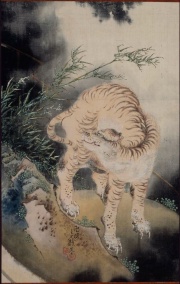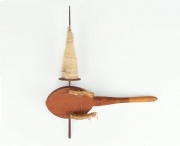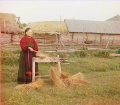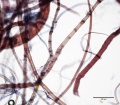Difference between revisions of "Flax"
JMcGlinchey (talk | contribs) |
|||
| (10 intermediate revisions by 3 users not shown) | |||
| Line 1: | Line 1: | ||
| − | [[File:11.7405-F3409CR-d1.jpg|thumb|]] | + | [[File:11.7405-F3409CR-d1.jpg|thumb|Hanging Scroll <br>MFA# 11.7405]] |
== Description == | == Description == | ||
| + | [[File:67.59-SC58867.jpg|thumb|Spindle with flax <br>MFA# 67.59]] | ||
| + | Any plant of the genus Linum, especially ''Linum usitatissimum'' that is native to Europe. Flax plants are grown for both their fibers and seeds. Flax fibers are believed to be the first vegetable fiber used by man (about 5000 CBE). They have been found in prehistoric cave dwellings in Switzerland. Ancient Egyptian pictographs detail the process for making flax into cloth and [[linen]] mummy cloths have been found. By the 17th century, linen manufacturing was an important industry in Western Europe. The soft, flexible fibers are produced by retting the stem of the plant, then washing and cleaning the fibers. Flax fibers of thinner and longer than [[cotton]], but the fiber tube has thicker walls resulting in a stronger thread. Additionally, flax fibers are used to make shoe thread, bookbinding thread, fish line, twine, and paper. Waste flax fibers are used in banknotes, cigarette covers, and writing paper. The seeds from the flax plant are used to produce [[linseed oil]]. Linseed oil is used for cooking and as a paint medium. | ||
| − | + | * For flax fiber identification, see http://cameo.mfa.org/wiki/Category:FRIL:_Flax_(Linen) | |
| − | |||
| − | |||
| − | |||
== Synonyms and Related Terms == | == Synonyms and Related Terms == | ||
| + | [[File:96.906-B1378.jpg|thumb|Woman spinning flax<br>MFA# 96.906]] | ||
| + | ''Linum usitatissimum''; Hør (Deut.); lino (Esp.); linum (Fr.); vlas (Ned.); linho (Port.); lin (Sven.); | ||
| + | == Risks == | ||
| − | + | Degrades slowly in sunlight and temperatures above 120C. Resistant to mildew, insects and pests. Silverfish will eat starched flax. | |
| + | == Physical and Chemical Properties == | ||
| − | + | Resistant to alkali, dilute acid, most organic solvents. Degrades in strong acids. Elongation = 1.8% (dry); 2.2% (wet); Moisture regain = 12%; Fiber length = 6-65 mm; diameter = 0.02 mm; Natural fiber color = yellowish to pale gray. Chlorine test stains linen fibers a bright red. Density = 1.5 | |
| − | |||
| − | Resistant to alkali, dilute acid, most organic solvents. Degrades in strong acids. Elongation = 1.8% (dry); 2.2% (wet); Moisture regain = 12%; Fiber length = 6-65 mm; diameter = 0.02 mm; Natural fiber color = yellowish to pale gray. Chlorine test stains linen fibers a bright red. | ||
| − | |||
| − | |||
| − | |||
| − | |||
| − | |||
| − | |||
Paper fiber type: non-woody/bast. Using transmitted light microscopy, fibers are identified by their prominent nodes with cross-markings and dislocations. Fibers are long with indistinguishable lumens. If shive was used, additional small pitted fibers, pitted vessel elements, and other cells may be present. Difficult to distinguish from other [[bast fiber]]. Appearance with [[Graff "C" stain]]: pinkish red due to high [[alpha cellulose]]; nodes will stain red. Average dimensions of fibers: length 33mm, width 19μm. Common pulping method: [[Soda]]. | Paper fiber type: non-woody/bast. Using transmitted light microscopy, fibers are identified by their prominent nodes with cross-markings and dislocations. Fibers are long with indistinguishable lumens. If shive was used, additional small pitted fibers, pitted vessel elements, and other cells may be present. Difficult to distinguish from other [[bast fiber]]. Appearance with [[Graff "C" stain]]: pinkish red due to high [[alpha cellulose]]; nodes will stain red. Average dimensions of fibers: length 33mm, width 19μm. Common pulping method: [[Soda]]. | ||
| − | |||
| − | |||
| − | |||
| − | |||
| − | |||
| − | |||
| − | |||
| − | |||
| − | |||
| − | |||
== Additional Images == | == Additional Images == | ||
| Line 44: | Line 29: | ||
File:34 flax 200X pol.jpg|Flax fiber, polarized light | File:34 flax 200X pol.jpg|Flax fiber, polarized light | ||
File:Flax 40x nodes bastshive.jpg|Flax fibers with shive stained with Graff "C" stain | File:Flax 40x nodes bastshive.jpg|Flax fibers with shive stained with Graff "C" stain | ||
| − | |||
| − | |||
</gallery> | </gallery> | ||
| − | == | + | ==Resources and Citations== |
| − | + | * G.Cook, ''Handbook of Textile Fibres:I. Natural Fibres'', 5th edition, Merrow Publishing Co., Durham, England, 1984. | |
* ''The Dictionary of Paper'', American Paper Institute, New York, Fourth Edition, 1980 | * ''The Dictionary of Paper'', American Paper Institute, New York, Fourth Edition, 1980 | ||
| − | |||
* Hoechst Celanese Corporation, ''Dictionary of Fiber & Textile Technology'' (older version called Man-made Fiber and Textile Dictionary, 1965), Hoechst Celanese Corporation, Charlotte NC, 1990 | * Hoechst Celanese Corporation, ''Dictionary of Fiber & Textile Technology'' (older version called Man-made Fiber and Textile Dictionary, 1965), Hoechst Celanese Corporation, Charlotte NC, 1990 | ||
| − | |||
* Matt Roberts, Don Etherington, ''Bookbinding and the Conservation of Books: a Dictionary of Descriptive Terminology'', U.S. Government Printing Office, Washington DC, 1982 | * Matt Roberts, Don Etherington, ''Bookbinding and the Conservation of Books: a Dictionary of Descriptive Terminology'', U.S. Government Printing Office, Washington DC, 1982 | ||
| − | |||
* Marjory L. Joseph, ''Introductory Textile Science'', Holt, Rinehart and Winston, Fort Worth, TX, 1986 | * Marjory L. Joseph, ''Introductory Textile Science'', Holt, Rinehart and Winston, Fort Worth, TX, 1986 | ||
| − | + | * Wikipedia: [https://en.wikipedia.org/wiki/Flax Flax] (Accessed Nov. 2, 2005 and October 2024) | |
| − | * Wikipedia | ||
| − | |||
* G.S.Brady, ''Materials Handbook'', McGraw-Hill Book Co., New York, 1971 | * G.S.Brady, ''Materials Handbook'', McGraw-Hill Book Co., New York, 1971 | ||
| − | |||
* Ralph Mayer, ''A Dictionary of Art Terms and Techniques'', Harper and Row Publishers, New York, 1969 (also 1945 printing) | * Ralph Mayer, ''A Dictionary of Art Terms and Techniques'', Harper and Row Publishers, New York, 1969 (also 1945 printing) | ||
| − | |||
* Henry Hodges, ''Artifacts: An Introduction to Early Materials and Technology'', Ronald P. Frye, Kingston, Canada, 1988 | * Henry Hodges, ''Artifacts: An Introduction to Early Materials and Technology'', Ronald P. Frye, Kingston, Canada, 1988 | ||
| − | |||
* A.Lucas, J.R.Harris, ''Ancient Egyptian Materials and Industries'', Edward Arnold Publishers Ltd., London, 4th edition, 1962 | * A.Lucas, J.R.Harris, ''Ancient Egyptian Materials and Industries'', Edward Arnold Publishers Ltd., London, 4th edition, 1962 | ||
| − | |||
* Marja-Sisko Ilvessalo-Pfäffli. ''Fiber Atlas: Identification of Papermaking Fibers'' (Springer Series in Wood Science). Springer, 1995. | * Marja-Sisko Ilvessalo-Pfäffli. ''Fiber Atlas: Identification of Papermaking Fibers'' (Springer Series in Wood Science). Springer, 1995. | ||
| − | |||
* Book and Paper Group, ''Paper Conservation Catalog'', AIC, 1984, 1989 | * Book and Paper Group, ''Paper Conservation Catalog'', AIC, 1984, 1989 | ||
| − | |||
* Richard S. Lewis, ''Hawley's Condensed Chemical Dictionary'', Van Nostrand Reinhold, New York, 10th ed., 1993 | * Richard S. Lewis, ''Hawley's Condensed Chemical Dictionary'', Van Nostrand Reinhold, New York, 10th ed., 1993 | ||
| − | |||
* ''Van Nostrand's Scientific Encyclopedia'', Douglas M. Considine (ed.), Van Nostrand Reinhold, New York, 1976 | * ''Van Nostrand's Scientific Encyclopedia'', Douglas M. Considine (ed.), Van Nostrand Reinhold, New York, 1976 | ||
| − | |||
* Random House, ''Webster's Encyclopedic Unabridged Dictionary of the English Language'', Grammercy Book, New York, 1997 | * Random House, ''Webster's Encyclopedic Unabridged Dictionary of the English Language'', Grammercy Book, New York, 1997 | ||
| − | |||
* Walter Rantanen. "Fiber ID Course." Integrated Paper Services. June 2013. Lecture. | * Walter Rantanen. "Fiber ID Course." Integrated Paper Services. June 2013. Lecture. | ||
| − | |||
* Art and Architecture Thesaurus Online, http://www.getty.edu/research/tools/vocabulary/aat/, J. Paul Getty Trust, Los Angeles, 2000 | * Art and Architecture Thesaurus Online, http://www.getty.edu/research/tools/vocabulary/aat/, J. Paul Getty Trust, Los Angeles, 2000 | ||
| − | [[Category:Materials database]] | + | [[Category:Materials database]][[Category:MWG]] [[Category:Sheet, Fabric]] |
Latest revision as of 12:19, 2 October 2024
Description
Any plant of the genus Linum, especially Linum usitatissimum that is native to Europe. Flax plants are grown for both their fibers and seeds. Flax fibers are believed to be the first vegetable fiber used by man (about 5000 CBE). They have been found in prehistoric cave dwellings in Switzerland. Ancient Egyptian pictographs detail the process for making flax into cloth and Linen mummy cloths have been found. By the 17th century, linen manufacturing was an important industry in Western Europe. The soft, flexible fibers are produced by retting the stem of the plant, then washing and cleaning the fibers. Flax fibers of thinner and longer than Cotton, but the fiber tube has thicker walls resulting in a stronger thread. Additionally, flax fibers are used to make shoe thread, bookbinding thread, fish line, twine, and paper. Waste flax fibers are used in banknotes, cigarette covers, and writing paper. The seeds from the flax plant are used to produce Linseed oil. Linseed oil is used for cooking and as a paint medium.
- For flax fiber identification, see http://cameo.mfa.org/wiki/Category:FRIL:_Flax_(Linen)
Synonyms and Related Terms
Linum usitatissimum; Hør (Deut.); lino (Esp.); linum (Fr.); vlas (Ned.); linho (Port.); lin (Sven.);
Risks
Degrades slowly in sunlight and temperatures above 120C. Resistant to mildew, insects and pests. Silverfish will eat starched flax.
Physical and Chemical Properties
Resistant to alkali, dilute acid, most organic solvents. Degrades in strong acids. Elongation = 1.8% (dry); 2.2% (wet); Moisture regain = 12%; Fiber length = 6-65 mm; diameter = 0.02 mm; Natural fiber color = yellowish to pale gray. Chlorine test stains linen fibers a bright red. Density = 1.5
Paper fiber type: non-woody/bast. Using transmitted light microscopy, fibers are identified by their prominent nodes with cross-markings and dislocations. Fibers are long with indistinguishable lumens. If shive was used, additional small pitted fibers, pitted vessel elements, and other cells may be present. Difficult to distinguish from other Bast fiber. Appearance with Graff "C" stain: pinkish red due to high Alpha cellulose; nodes will stain red. Average dimensions of fibers: length 33mm, width 19μm. Common pulping method: Soda.
Additional Images
Resources and Citations
- G.Cook, Handbook of Textile Fibres:I. Natural Fibres, 5th edition, Merrow Publishing Co., Durham, England, 1984.
- The Dictionary of Paper, American Paper Institute, New York, Fourth Edition, 1980
- Hoechst Celanese Corporation, Dictionary of Fiber & Textile Technology (older version called Man-made Fiber and Textile Dictionary, 1965), Hoechst Celanese Corporation, Charlotte NC, 1990
- Matt Roberts, Don Etherington, Bookbinding and the Conservation of Books: a Dictionary of Descriptive Terminology, U.S. Government Printing Office, Washington DC, 1982
- Marjory L. Joseph, Introductory Textile Science, Holt, Rinehart and Winston, Fort Worth, TX, 1986
- Wikipedia: Flax (Accessed Nov. 2, 2005 and October 2024)
- G.S.Brady, Materials Handbook, McGraw-Hill Book Co., New York, 1971
- Ralph Mayer, A Dictionary of Art Terms and Techniques, Harper and Row Publishers, New York, 1969 (also 1945 printing)
- Henry Hodges, Artifacts: An Introduction to Early Materials and Technology, Ronald P. Frye, Kingston, Canada, 1988
- A.Lucas, J.R.Harris, Ancient Egyptian Materials and Industries, Edward Arnold Publishers Ltd., London, 4th edition, 1962
- Marja-Sisko Ilvessalo-Pfäffli. Fiber Atlas: Identification of Papermaking Fibers (Springer Series in Wood Science). Springer, 1995.
- Book and Paper Group, Paper Conservation Catalog, AIC, 1984, 1989
- Richard S. Lewis, Hawley's Condensed Chemical Dictionary, Van Nostrand Reinhold, New York, 10th ed., 1993
- Van Nostrand's Scientific Encyclopedia, Douglas M. Considine (ed.), Van Nostrand Reinhold, New York, 1976
- Random House, Webster's Encyclopedic Unabridged Dictionary of the English Language, Grammercy Book, New York, 1997
- Walter Rantanen. "Fiber ID Course." Integrated Paper Services. June 2013. Lecture.
- Art and Architecture Thesaurus Online, http://www.getty.edu/research/tools/vocabulary/aat/, J. Paul Getty Trust, Los Angeles, 2000











